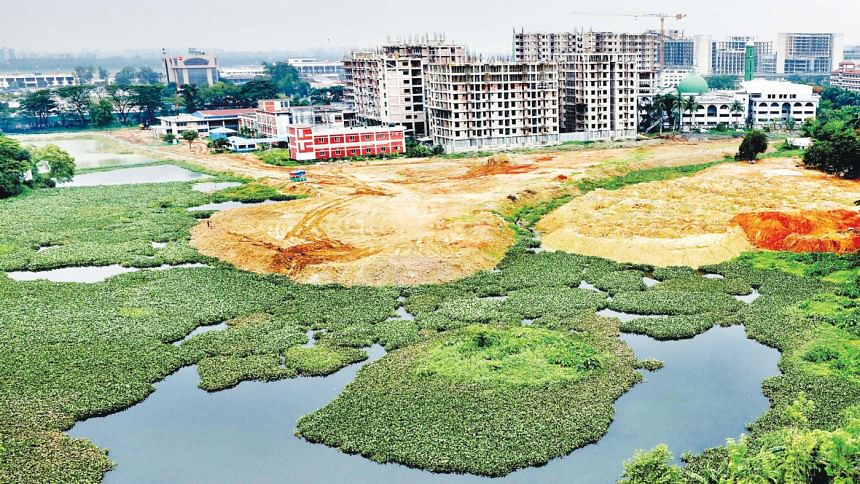Trading a lake for houses

The Civil Aviation Authority of Bangladesh is filling up a large waterbody on the eastern side of the Hajj camp at the capital's Ashkona for a housing project for its officials and employees, violating a conservation law.
The aviation regulator has not even taken permission from Rajdhani Unnayan Kartripakkha (Rajuk) to fill up the around 30-acre pond, which has long been used as a water retention pond for Ashkona, Uttar Khan and Dakkhin Khan areas.
Experts fear the filling up of such a vast pond, earmarked clearly as a waterbody in Rajuk's Detailed Area Plan (DAP), will aggravate the perennial waterlogging problem in the area.
The Caab has been filling it up with earth for the last four months and has already filled up around half the area.
A recent visit by The Daily Star found that workers were busy filling up the pond with a crane. A heap of earth, piled up on the already-filled portions, is waiting to be dumped.
According to Playground, Open Spaces, Gardens, and Water Bodies Conservation Act 2000, no one can fill up water bodies or stop the normal water flow.
Md Ashraful Islam, project director of DAP, said, "Filling this waterbody will have an adverse impact on areas like Ashkona, Uttar Khan and Dakkhin Khan. The pond has been playing a vital role in retaining rainwater. If it's filled up, where would the rainwater from the areas go?"
He said the pond is also earmarked as waterbody in the revised DAP, yet the Caab did not take any no objection certificate (NOC) from Rajuk before starting to fill it up.
Anisur Rahman Nayeem, councillor of ward-47 of Dhaka North City Corporation, said waterlogging has already been worsening in these areas due to the move.
"For the last 50 years, the waterbody has been used as a rainwater retention pond. Filling it up would increase waterlogging problems," he said.
Water bodies in and around the capital have indiscriminately been filled up in the last few decades, primarily due to rapid urbanisation and unplanned growth.
According to a 2019 study by the Bangladesh Institute of Planners (BIP), individuals, businesses, real-estate developers, organisations, and even government agencies have gobbled up 1,072 acres (57 percent) of the 1,879 acres of flood flow zones in Dhaka metropolitan areas in that decade.
Since the official gazette on the city's Detailed Area Plan (DAP) was issued in 2010, the core city lost 3,440 out of 9,556 acres of flood flow zones, water retention areas, and water bodies till 2019, it said.
Experts say the unrelenting stress on water bodies, along with the poor drainage system, exposes the city dwellers to severe waterlogging even after moderate rain.
"The master plan of Dhaka is not safe in the hands of the government. This is because the government agencies fill up water bodies at will and tend to justify it as being done in public interest," said Syeda Rizwana Hasan, chief executive of Bangladesh Environmental Lawyers Association.
"If filling up wetland contrary to the master plan is done by the government, it causes two long-term damages. First, it weakens the moral authority of the government to punish violators, and second, it devalues the sanctions of the master plan," she told The Daily Star.
Both are dangerous for a city already ranking very low in the livability index, she added.
Adil Mohammad Khan, former general secretary of Bangladesh Institute of Planners, said a government body like Caab cannot violate the DAP and fill up a waterbody.
"This is an immoral practice and they cannot fill up water bodies without taking NOC from Rajuk," he told this newspaper.
He further said many government agencies do not conduct proper impact assessment before taking up development projects. As a result, they end up filling the water bodies, he said.
Adil said there is a directive from the prime minister to keep around 12 percent waterbodies while building any housing project in any area.
It is not only Rajuk's duty, but Caab also has to keep 12 percent waterbodies in the areas that are under its jurisdiction, he added.
Councillor Anisur Rahman Nayeem said the city corporation had repeatedly requested Caab not to fill it up and also informed the matter to the DNCC mayor.
"Caab is a government organisation. If they do not follow the wetland protection act, who will punish them? Who will hold them accountable?" he asked.
"Under the leadership of the DNCC mayor, we have been cutting a lake for the last couple of weeks on the eastern side of the Hajj camp as an alternative, to reduce the waterlogging problem in the areas," he said.
Selim Reza, chief executive officer of DNCC, said they will take necessary steps in this regard after getting information from the field level
Caab Chairman Air Vice Marshal M Mafidur Rahman told The Daily Star that they are implementing the housing project without affecting the environment.
"We have appointed a foreign consultant for structural design of the housing project and the work is going on accordingly."
Mafidur also said they are not violating the Playground, Open Spaces, Gardens, and Water Bodies Conservation Act 2000.
He said the land on which the housing project is being implemented is Caab's own land.
"This is not Rajuk's land," he said.


 For all latest news, follow The Daily Star's Google News channel.
For all latest news, follow The Daily Star's Google News channel. 



Comments